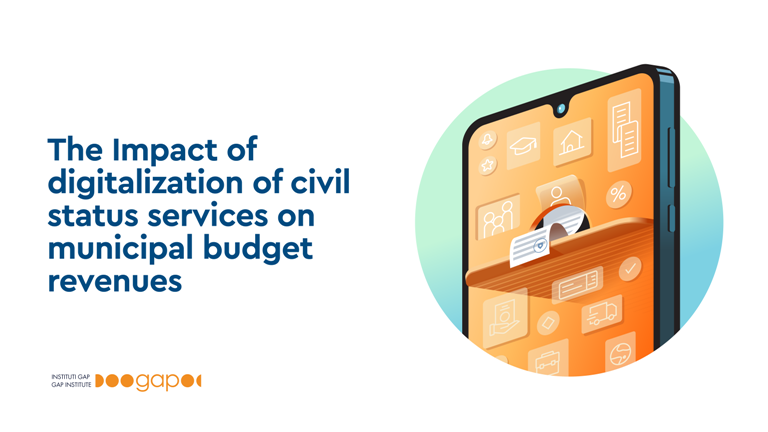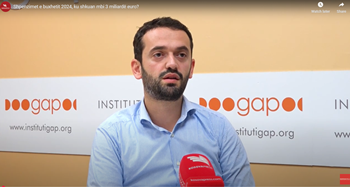The Impact of digitalization of civil status services on municipal budget revenues
08/04/2023
Today GAP Institute published the report “The Impact of digitalization of civil status services on municipal budget revenues”
The Government of Kosovo is aiming to cut the administrative burden by automating service delivery processes and reducing costs that citizens must bear for receiving such services. The term administrative burden means any procedure that creates additional expenses to the citizens and causes delays in receiving administrative services. In this brief, the GAP Institute shows how the process of reducing the administrative burden and digitalization of civil status service delivery would affect the municipalities.
From June 2022, steps have been undertaken to collect information and deliver certain services through the e-Kosova electronic platform. From June through December 2022, citizens retrieved 238,015 civil status documents using the platform. By contrast, in 2022, citizens received nearly 2.2 million documents in paper format from the civil registry section in the 38 municipalities of Kosovo. According to GAP Institute calculations, the introduction of the online service delivery of civil status documents from the e-Kosova platform is expected to produce savings of over EUR 1.5 million per year for the citizens. Similarly, municipalities are expected to reduce their staff related expenditures, particularly in local community facilities, as the closure and restructuring of many of them has been recommended by the Civil Registration Agency (CRA).
The dilemma introduced by the initiative to reduce the administrative burden is whether this process would be accompanied by budget losses, especially by the municipalities, since revenues generated by the local administration are considered and treated as own source revenues for the local level. According to GAP Institute calculations, the revenues of the 38 municipalities in 2022 generated from the issuance of documents and delivery of services from the civil status section were about EUR 2.3 million, while the expenditures were about EUR 2.2 million.
The share of financial revenues from the civil status section services in the municipalities’ own source revenues is low. In most of the municipalities, this share ranges between 1% and 4%. Therefore, the reduction or elimination of the administrative burden is not expected to have a significant impact on the municipal budget. From the information received from the municipalities, it can be deduced that there is no correlation between the number of staff in the civil status offices in the municipalities and the number of inhabitants in the respective municipalities. Municipality of Prishtinë, officially estimated to have approximately 220,000 inhabitants, employs 39 staff or one staff per 5,641 inhabitants, while Skenderaj, which is estimated to have 52,600 inhabitants, employs 17 staff or one staff per 3,094 inhabitants, further the Municipality of Klinë with 40,000 inhabitants employs 15 staff or one staff per 2,667 inhabitants.
To read the full report click here.















